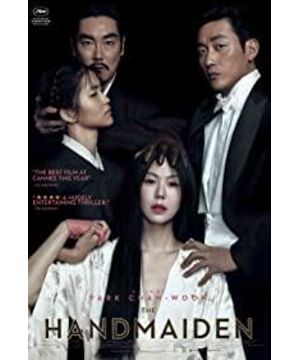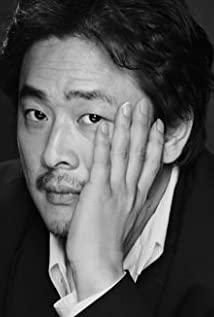Although Park Chan-wook did not intend to plant flowers, for him, "retelling history" is more like a willow in the shade. Storytelling/suspense is the first thing to look at, and the expression of lesbian/feminist is only part of it. Although, this expression is limited by culture and himself everywhere, thus showing a clumsy, divided and awkward state. Basically, it's the 'camp' style at its best: hard-hitting, ambitious, pompous, dramatic, passionate, over-the-top, and at the same time out of shape, sloppy, and unfinished for that very reason. Yet the flower of evil is better than nothing, better than the seed that festers into mud and drowns out of sight, as it has happened for thousands of years. If you have to use gimmicks, routines, and eroticism to break into the eyes of the world, why not; in the initial stage, commercialization, simplification, and romanticization are so necessary. "Titanic" first, "Revolutionary Road" after.
The gentleman saw Maud and Su's desperate kiss on their wedding night, but he didn't take it seriously. There was a kind of sympathy for "it's the last night anyway", and a kind of disdain for "it's not for real", "Girls only have blind dates in books. In love", in the original book, the gentleman said this; in the end he saw that Maud continued to hide the truth, but he still didn't understand, "What are you trying to do, Maud?" And the earl also noticed it in a trance at first, Xiuzi wiped sweat while reading, Holding hands with Sook Hee on the boat, and stealing a kiss from the hotel, but he didn't realize it until the last moment before he died, and the camera flashed back in his mind, so that's what happened. The gentleman and the earl are our audience. It's illegal, it's gay, it's guilty, it's gay, and lesbian doesn't exist. It is a play for girls when they are playing, a substitute when a male partner is lacking, and a mutual masturbation when they are lonely. It was ignored to the point of turning a blind eye, even if it happened in front of you, not believing it. The intimacy between girls is not a threat to them, they have that kind of self-confidence that doesn't know where to start, believing that after experiencing the "experience" of teenage and ignorance, they will eventually "choose" and "go on the right track" with men.
"Miss" in its direct, fierce, and magnanimous way announces the unquestionable existence of this emotion, and the powerful destructive power it can produce. The whole atmosphere exudes a kind of "that's right", "that's it", "don't stop" just like the sex scene, instead of "what am I doing", "I can't control myself" and "Ya Die" struggle. "Miss" is so precious compared to those movies that are used to sneaking edge balls and always keen to give you hints on the edge. In the preface of the script, the director's last sentence is a bit affectionate to Shu Ji's line: "I am very moved, you who like "Miss" have the ability to protect "Miss"." The hard-won blooming flower, Of course, it was held in the palm of my hand with tears in my eyes.
The original work is profound and subtle, and it is a night of long waking and sleepless nights. "Miss" avoids most of its problems, falls asleep sweetly, and creates a gorgeous dream. The former makes people hide in the bottom of their hearts and suffer silently, while the latter makes people imagine hanging on the wall like a painting, looking at it with a smile. #What kind of experience is it to be a very burning love film#
Regarding the connotation of the original work's "retelling of history", I understand it this way, when an individual suddenly discovers that he is a marginal person or an outsider in this world at a certain moment, the vast history and the vast society do not have an inch of their own place. Under the premise, he has a natural desire to re-examine, explore, and dig the world, so as to rediscover himself and finally establish his own existence. This is Sarah Waters, and this is Sarah Waters' Maud. This is the prior experience of this individual necessarily becoming a writer. They spend decades accepting their ancestors, and then spend the remaining decades tearing up their ancestors. They spend their lives to complete a betrayal and murder from the inside out, so they are like sinners. So in the end Maud returned to the prison, the city of thorns. The difference is that the place of torture has become Eve and Eve's Garden of Eden - returning from sin to innocence - reaching the supreme perfection in the "retrograde" with the world.
After twenty years of being forced to read and write, Maud still chose to read and write after gaining freedom and property. After twenty years of being abused by bells, Hideko still chooses bells as sexual props after gaining freedom and property. Is this an irony? Or is it because of limited vision? neither. This is more emphasis on self-selection. Emphasize that it did not choose me, but I chose it. Is studying in school the same as studying after graduation?
Self-selection, Maude expresses with writing, Hideko expresses with sex. Maud is a writer and Hideko is a lover. Maud wants to be free, Hideko wants to die. Maud always asks "what's London like" and Hideko doesn't want to know about those ports or anything, "just stay with you". With the fate of her aunt's suicide as an example and the future of her uncle's desire to marry, Hideko, who is in a more desperate situation, will die without love, and her love is even more dangerous. Compared with Maude's calmness, maturity, and spiritual self-sufficiency, Xiuzi is a manic-depressive patient who has fallen into fetters, suffering from a disease called love: he just punished the servant, and became obedient when he took a bath; just punished Shuji. , and intends to destroy himself; the last time I saw you there were stars in my eyes, but this time I was tired and contemptuous; while sticking like a cat, I cried, made trouble, and hanged myself; Who knows what she's going to do.
Maud inherits Emily Bronte's soberness and seclusion, and has a higher concept; Xiuzi inherits Du Liniang's devotion and fiery, and has higher emotions. Maud conforms to the ideal personality, and Hideko conforms to the secular personality, both are real and charming images.
Maud is independent, which has made me imagine an alternative ending more than once: Sue wasn't lucky enough to find the deed in her clothes, (which happened by accident) then Maud would perpetually carry on her life. A life of misunderstanding, fragile and firm quietly blooming in the deepest part of the black forest, alone bearing the gushing and silent desire and resentment. This is the original prototype of "Angel in the Room".
And Hideko and Sookie couldn't be separated. The director emphasizes their equivalence everywhere and integrates to the point of obsessive-compulsive disorder. Their relationship is as perfect, solid, and airtight as the mortise and tenon. From the perspective of mind and body, each of them has a strong side and a weak side. It is God's gift that these four-level personalities of each of them can complement each other's four-level personalities. In terms of mind, Hideko has a high IQ, controls the overall situation, quietly dominates Sook Hee, and at the same time needs to be protected, so she blatantly relies on Sook Hee; Sook Hee is simple and innocent, being tricked and seduced, and at the same time she is powerful The maternal side also shelters Hideko. Physically, Xiuzi is weak, and is supported by Shuji's arms. She needs to take a ladder to cross the wall. At the same time, she is strong, and two slaps slapped Shuji into confusion; Shuji's action is unquestionable and decisive. , a fighting talent, and at the same time obeying Hideko. Isn't this the ideal state of "love makes the personality perfect"? The poses of their love are also so symmetrical and even, and this is probably not just for the beauty of the composition. Xiuzi learns swear words from Shuji, and Shuji learns culture from Xiuzi. Hideko said twice, "If only I hadn't been born," Sook Hee said twice, "If only I hadn't come here." Xiuzi's habitual short grin, and Shuji's daily loud laugh, merged into an indistinguishable sweet snicker in the last scene. Add the title to "the handmaiden" (the maid) to annotate "Miss". The last time I saw such a sticky relationship was when Katherine said "I'm Heathcliff".
Maude is understandably admired, and Hideko and Sookie are enviable.
There is no process of self-identification at all - all that shitty stuff about sexuality (discovery, surprise, denial, conflict, shame or whatever). The rhythm of falling in love is so fast and the atmosphere on the bed is so strong. Deliberately different from the kind of thrilling, fragile sex that is like walking a tightrope in the sky, like trembling in the breeze, the sex of "Miss" hits it off, harmonious and tacit, as sweet as gnawing on a watermelon. It seems that only in this way can the naturalness and righteousness of feelings be reflected. Regarding sexual orientation, it is not within the scope of expression.
There is also no level of social pressure. Sook Hee didn't have any concerns like "I? In love with a girl? I seem to hear the mockery from Rand Street". The "Rand Street" here is not only not ridiculed, but even bizarrely allied in the end. But when Shu Ji heard the young lady say "I love someone else", what was she thinking when she closed her eyes? She is thinking "the man who loves you has the ability to protect you, (and I...)", the inferiority caused by love makes love cowardly. But expressions like this are always rare and fleeting.
It avoids the connotations of "personal and history", "exploration and retelling", "sin and regeneration", etc., avoids the inevitable gap and imbalance between lovers' relationships, and avoids the double pressure of internal and external, so even if it makes Darkness is darker, beauty is more beautiful, and eroticism is more erotic. Even if the "finger" is mutated into snakes and octopus tentacles, "Miss" looks so simple.
Just like these two children, it is difficult for me to tell who is more like a child in front of each other. Hideko said "I'll go with you" (picking mushrooms), don't leave me, I'll play too; said "How do I know" (those shy things), pouting, frowning, overflowing with anger Screen. And Shu Ji was wearing the shoes that Xiuzi gave, and she couldn't stop walking in front of her, jumping up and down, jumping up and down; watching the earl vomit, Xiuzi turned her head and smiled sweetly immediately, demonstrating her strength "The day of June" ”; carefully and clumsily write the names of himself and Xiuzi one by one; the first action when teaching Xiuzi is to eat candy, and after being beaten by Xiuzi, he also eats candy, and when Xiuzi takes a bath, he not only holds the baby but also holds one. candy in hand. So I think in the end you probably don't trade rings but candy.
The obstacles between the two children appeared like a shadow, and they all passed by in a flash. They are a cloud. The two were in silence as they waited for the arrival of the Count. A cloud made the studio darken instantly. When Hideko questioned her existence, the cloud piled up in the sky. It was a gust of wind, the panic that Hideko felt when she was intimate with others, and the panic that she felt when she saw Shu Ji panicked, was stirred up even more violently by the gust of wind. It was a rain, and the sense of distance that Shu Ji felt when she first came to the mansion to contact the maids, the young lady, and the uncle was accompanied by the rain; the powerlessness and anger when she watched Xiuzi being violated through the window was soaked by the heavy rain. bloated.
The swollen jealousy further ferments the lust. So we see a flower. Before Shuji came, there were no flowers on Xiuzi's bedside, and the vase was placed in a corner away from the bedside; on the first night Shuji came, flowers appeared on the bedside, showing a dark pink color; In the evening, the blooming lilies flamboyantly brushed the presence; and when Shuji pinched Xiuzi's feet and Xiuzi expressed her whiteness faintly, the pink flowers on the head of the bed were bright and strong.
Lily does not come out of nowhere, it appears when you grind your teeth. As Sook Hee held Hideko's face, flowers bloomed among them. Time stopped, and the aroma and heat condensed into water droplets on the corner of Sook Hee's mouth. In this stagnation and confrontation, the feeling of Sook Hee's fingers entering and rubbing was beyond expectations. At this time, Hideko's touch was more subconscious. Just like a normal girl, if you are so close, your hands will naturally be idle to fiddle with her hair, and there may not be lust in it. But when we parted, I suddenly realized the ambiguity just now, so I bowed my head shyly, but I didn't want to let go of the fleeting tender atmosphere, so I said, why don't you come in again.
Alas, I was going to die and you were going to be mad, but how did things end up like this. The face you held in your hands, why did it turn red by itself.
Born from the symbols of Japanese mythology, Hideko and Shuji are the incarnations of the moon god. In the countless nights before, Shu Ji looked at the moon on the door, turned over and sighed: The moon should not be imprisoned here. And in the end, when all obstacles and contradictions were magically resolved, the clouds dissipated, the wind stopped, the rain stopped, and the bright moon finally hung high above the sea and sky.
View more about The Handmaiden reviews











